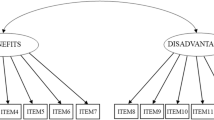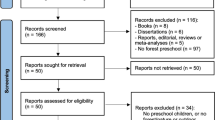Abstract
In this study, we investigate the perception and behavior levels of environmental citizenship of university students between the ages of 18–25. The target population was selected as the students of engineering faculties in İstanbul and Sakarya provinces, which are in the Marmara Region of Turkey. In this scope, we develop a sophisticated questionnaire that allows some variables such as the socioeconomic structure and the educational status of the parents to assess the current environmental behavior and thoughtfulness of the individual and publish online to receive the response. We analyze the quantitative data using the descriptive technique. Exploratory factor analysis was used to detect the factors that underlie a dataset based on the correlations between questionnaire items. Independent t test and one-way of variance (ANOVA) were used to analyze the quantitative data. We determine that there is a significant difference among the students’ environmental thought in terms of gender, the participation of voluntary environmental organizations, voluntary in the family, education level of father and the students’ environmental behavior in terms of the education level of the mother. We also find that there is a significant difference between students studying in engineering faculties and environmental engineering students in terms of some environmental behavior.

(modified from Sansal 2019)
Similar content being viewed by others
References
Archbald, D., & Gundlach, P. (1970). Environmental education: An integrated approach. Environmental Education, 1(3), 75–76. https://doi.org/10.1080/00139254.1970.10801496.
Asah, S. T., et al. (2018). Mechanisms of children’s exposure to nature: Predicting adulthood environmental citizenship and commitment to nature-based activities. Environment and Behavior, 50(7), 807–836. https://doi.org/10.1177/0013916517718021.
Aslan, O., et al. (2008). Adaptation of environmental attitude scale and determination of environmental attitudes of primary school students. Ahmet Keleşoğlu Education Faculty Journal, 25, 285–295.
Aydın, F., et al. (2011). Gifted students’ attitudes towards the environment: A case study from Turkey. African Journal of Agricultural Research, 6(7), 1876–1883.
Council of Higher Education (CoHe) of Turkey. (2018). Retrieved July 20, 2019 from https://yokatlas.yok.gov.tr.
Dimick, A. S. (2015). Supporting youth to develop environmental citizenship within/against a neoliberal context. Environmental Education Research, 21(3), 390–402. https://doi.org/10.1080/13504622.2014.994164.
Erol, G. H., & Gezer, K. (2006). Prospective of elementary school teachers’ attitudes toward environment and environmental problems. International Journal of Environmental and Science Education, 1(1), 65–77.
European Network for Environmental Citizenship (ENEC). (2018). Retrieved from March 1, 2020 from http://enec-cost.eu/our-approach/enec-environmental-citizenship.
Environmental Network of Environmental Citizenship (ENEC) COST ACTION 16629. (2018). European network for environmental citizenship. Retrieved July 25, 2019 from https://www.cost.eu/actions/CA16229/#tabs|Name:overview.
Fernández-Manzanal, R., et al. (2007). Evaluation of environmental attitudes: Analysis and results of a scale applied to university students. Science Education, 91(6), 988–1009.
Gambro, J. S., & Switzky, H. N. (1994). A national survey of environmental knowledge in high school students: levels of knowledge and related variables.
Green, C., et al. (2016). Cultivating environmental citizenship in teacher education. Teaching Education, 27(2), 117–135. https://doi.org/10.1080/10476210.2015.1043121.
Güler, T. (2007). Environmental education in non-formal education (pp. 99–116). Inside: “Environmental education” environmental foundation of Turkey publication No: 178, Ankara.
Hadjichambis, C., & Paraskeva-Hadjichambi, D. (2020). Environmental Citizenship Questionnaire (ECQ): The development and validation of an evaluation instrument for secondary school students. Sustainability, 12(3), 821.
Hampel, B., et al. (1996). The impact of parental work experience and education on environmental knowledge, concern, and behavior amongst adolescents. Environmental Education Research, 2(3), 287–300.
He, X., et al. (2011). A comparative study of environmental knowledge, attitudes, and behaviors among university students in China. International Research in Geographical and Environmental Education, 20(2), 91–104.
Hedt, B. L., & Pagano, M. (2011). Health indicators: Eliminating bias from convenience sampling estimators. Statistics in Medicine, 30(5), 560–568.
Iversen, E., & Jónsdóttir, G. (2019). We did see the lapwing—Practicing environmental citizenship in upper-secondary science education. Environmental Education Research, 25(3), 411–421. https://doi.org/10.1080/13504622.2018.1455075.
Kibert, N. C. (2000). An analysis of the corrections between the attitude, behavior and knowledge components of environmental literacy in undergraduate university students. Dissertation, University of Florida, Florida, USA.
Levy, P. S., & Lemeshow, S. (2013). Sampling of populations: Methods and applications. New Jersey: Wiley.
Liu, D., et al. (2019). The fit of environmental citizenship models to energy tourism: The case of Ningbo China. Journal of Ecotourism. https://doi.org/10.1080/14724049.2019.1621882.
Makki, M. H., et al. (2003). Lebanese secondary school students’ environmental knowledge and attitudes. Environmental Education Research, 9(1), 21–33.
Ming, Y. H. (2007). Environmental citizenship among pre-service teachers in Malaysian teachers training colleges. Dissertation, University Putra Malaysia, Malaysia.
Moseley, C., et al. (2002). The effect of teaching outdoor environmental education on preservice teachers’ attitudes toward self-efficacy and outcome expectancy. The Journal of Environmental Education, 34(1), 9–15.
Özden, M. (2008). Environmental awareness and attitudes of student teachers: An empirical research. International Research in Geographical and Environmental Education, 17(1), 40–55.
Rietveld, T., & Van Hout, R. (1993). Statistical techniques for the study of language and language behaviour. Berlin: Mouton de Gruyter.
Report of (1972) the United Nations Conference on Human Environment (RUNCHE). (1972). Stockholm conference, Sweden.
Roth, E. R. (1969). Fundamental concepts for environmental management education (K-16). Environmental Education, 1(2), 65–74. https://doi.org/10.1080/00139254.1969.10801495.
Sahin, H., & Erkal, S. (2010). The attitudes of middle school students towards the environment. Social Behavior and Personality, 38(8), 1061–1072.
Sansal, B. (2019). On-line Turkey map. Retrieved July 7, 2019 http://www.allaboutturkey.com/.
Saygın, H., et al. (2018). Peaks over threshold method application on airborne particulate matter (PM10) and sulphur dioxide (SO2) pollution detection in specified regions of İstanbul. European Journal of Science and Technology, 14, 399–407.
Schild, R. (2015). What can political theory contribute to environmental education practice? The Journal of Environmental Education, 47(1), 19–34. https://doi.org/10.1080/00958964.2015.1092417.
Shean, G. D., & Shei, T. (1995). The values of student environmentalists. The Journal of Psychology, 129, 559–564.
Stapp, B. W. (1969). The concept of environmental education. Environmental Education, 1(1), 30–31. https://doi.org/10.1080/00139254.1969.10801479.
Sucuoğlu, H. (2017). The effect of constructivism based teaching on environmental citizenship levels. Dissertation. Near East University, Institution of Education Sciences, Environment Education and Management, Lefkoşe.
Talay, I., et al. (2004). On the status of environmental education and awareness of undergraduate students at Ankara University, Turkey. International Journal of Environment and Pollution, 21(3), 293–308.
Tecer, S. (2007). Zonguldak Karaelmas Üniversitesi, Fen Bilimleri Enstitüsü, Zonguldak, Yüksek Lisans tezi.
Teyfur, E. (2008). The effect of the academic achievement of primary school students and environmental club activities on their attitudes towards the environment (Case Study: İzmir). Ege Education Journal, 9(1), 131–149.
UNESCO-UNEP. (1977). Recommendations of the intergovernmental conference on environmental education Tbilisi, USSR. France: UNESCO Paris.
Uzun, N. (2005). Attitudes of primary school students towards environmental problems. II. In Social science conference, Ankara, Turkey.
Uzun, N. (2007). A study on secondary school students’ environmental knowledge and attitudes. Dissertation. Hacettepe Üniversity, Ankara.
Uzun, N., & Sağlam, N. (2006). Ortaöğretim öğrencileri için çevresel tutum ölçeği geliştirme ve geçerliliği (Environmental attitude scale development and validity for secondary school students). Hacettepe University Faculty of Education Journal, 30, 240–250.
Varışlı, T. (2009). Evaluating eighth grade students’ environmental literacy: The role of socio- demographic variables. Yüksek Lisans Tezi. Orta Doğu Teknik Üniversitesi, Sosyal Bilimler Enstitüsü, Ankara.
Yılmaz, K. (2013). An investigation into elementary school students’ perceptions of basic concepts about citizenship education. Hacettepe University Faculty of Education Journal, 28(1), 453–463.
Yücel, M., et al. (2008). Determination of environmental awareness of people in Adana. In Adana City problems’ conference (pp. 363–432), TMMOB Yayını.
Acknowledgements
This study is based on the environmental citizenship idea, which is also main working topic of COST ENEC CA16229 Action. Therefore, the authors would like to thank the project leaders Dr. Andreas Hadjichambis and Dr. Pedro Reis, who established a researcher network relevant to this working topic in Europe.
Author information
Authors and Affiliations
Corresponding authors
Additional information
Publisher's Note
Springer Nature remains neutral with regard to jurisdictional claims in published maps and institutional affiliations.
Electronic supplementary material
Below is the link to the electronic supplementary material.
Rights and permissions
About this article
Cite this article
Oral, H.V., Eren, Ö., Yay, A.S.E. et al. Environmental citizenship perception and behavior among university engineering students in the Marmara Region of Turkey. Environ Dev Sustain 23, 3638–3652 (2021). https://doi.org/10.1007/s10668-020-00736-8
Received:
Accepted:
Published:
Issue Date:
DOI: https://doi.org/10.1007/s10668-020-00736-8




